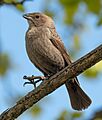Cowbird facts for kids
Quick facts for kids Cowbird |
|
|---|---|
 |
|
| Female brown-headed cowbird | |
| Scientific classification |
|
| Kingdom: | Animalia |
| Phylum: | Chordata |
| Class: | Aves |
| Order: | Passeriformes |
| Family: | Icteridae |
| Genus: | Molothrus Swainson, 1832 |
| Type species | |
| Fringilla pecoris Gmelin, JF, 1789
|
|
| Species | |
Cowbirds are a group of birds from the Americas. They belong to a family called Icteridae. What makes cowbirds special is how they raise their young. They are known as brood parasites. This means they lay their eggs in the nests of other bird species, instead of building their own nests and raising their own chicks.
Contents
Cowbirds: Birds with a Secret
What are Cowbirds?
Cowbirds are birds that live in the New World, which includes North and South America. Some types of cowbirds have spread to new areas where they weren't originally found. They are famous for their unique way of having babies, which we'll learn more about soon!
Where Do Cowbirds Get Their Name?
The scientific name for this group of birds is Molothrus. A scientist named William Swainson first described them in 1832. The name Molothrus comes from ancient Greek words that mean "struggle" and "to sire." The English name "cowbird" was first used in 1839. It's because these birds are often seen near cattle. They follow cows and other large animals to catch insects that get stirred up from the grass as the animals graze.
Types of Cowbirds
There are six main species of cowbirds in the Molothrus group:
- Screaming Cowbird (Molothrus rufoaxillaris)
- Giant Cowbird (Molothrus oryzivorus)
- Shiny Cowbird (Molothrus bonariensis)
- Bronzed Cowbird (Molothrus aeneus)
- Bronze-brown Cowbird (Molothrus armenti)
- Brown-headed Cowbird (Molothrus ater)
Extinct Cowbirds
Scientists have found fossils of an extinct cowbird species called Molothrus resinosus. It lived a long time ago in Peru. This bird might have disappeared when the large animals it lived near also became extinct.
What Cowbirds Eat
Cowbirds are not picky eaters! They mostly enjoy a diet of insects and seeds. As mentioned, some species are clever and follow large grazing animals like cattle. This helps them find insects that are disturbed by the animals' movements. It's like having a built-in insect-finding helper!
How Cowbirds Reproduce
Cowbirds have a very unusual way of having babies. Instead of building their own nests, female cowbirds lay their eggs in the nests of other bird species. This behavior is called brood parasitism. Here's how it works: A female cowbird carefully watches other birds build their nests and lay their eggs. When the nest is left alone for a short time, the cowbird quickly sneaks in and lays her own egg. She might even keep an eye on the nest afterward. The host bird, which is the bird whose nest is being used, then raises the cowbird chick as if it were its own. This can be tough for the host's own chicks, as the cowbird chick often grows faster and demands more food. Some host birds have learned to spot the cowbird eggs. They might try to push the strange egg out of their nest. However, sometimes if a host bird removes a cowbird's egg, the cowbird might come back and remove some of the host's own eggs. This encourages the host bird to accept the cowbird's eggs in the future. It's a tricky situation in the bird world!
Images for kids
See also
 In Spanish: Tordos para niños
In Spanish: Tordos para niños








